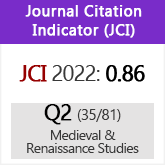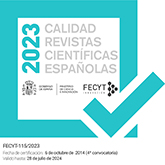Presencia trovadoresca en la Corona de Aragón
DOI:
https://doi.org/10.3989/aem.1996.v26.i2.673Abstract
The presence of troubadours at the Crown of Aragon was constant since the beginnings of this original poetic movement, and the Catalonian kings were the ones who sheltered the last members of this profession.
Troubadours gathered around King Alfonso the II of Aragon (or other troubadours who, from far away places, mentioned him in their poems), became strong supporters of the King's policy beyond the Pyrenees. Nevertheless these same troubadours didn't hesitate in criticizing several other attitudes of their Monarch. Therefore they acted as chroniclers of historical and domestic events of their time through highly artistic poems.
After the golden age of the troubadours, that concurs with the kingdom of King Alfonso, his grandchild Jaime I is mentioned (from his own Court or from the other side of the Pyrenees) by more than twenty troubadours or minstrels between around 1213 and 1276, year in which the King died. The internal affairs of his kingdom, his relationship with the Castillian Court, his passive attitude concerning the invasions of Provenç by the French king, his projected Crusade in 1269 and his death, are all events that can be found precisely recorded in the sirventeses of these poets.
Some of these songs written by professional troubadours in the second half of the Xllth century, show very clearly how they are not trying to conceal nor disguise the lack of confidence they feel concerning their profession. And they do so by mentioning the persistent rivalries among themselves, something that can be interpreted as a manifestation of their concern about the survival of their profession. Paulet de Marselha, Guiraut Riquier and Cerverí de Girona, among others, are constantly complaining of being offered only temporary shelter in the Courts, of always having to depend on the generosity and the mood of the Princes, of always having to request instead of being requested and, sometimes, of showing in the accounting roster of the Royal House as "juglar Paulet", as "G. de Cervaria, ioculatori" or as "mimmo", instead of being called troubadours, a profession so carefully defined by king Alfonso X el Sabio. They probably found another reason to feel afflicted in the fact of being connected with the minstrels. In those same years some moralist writers like Thomas de Cabham or Ramon LIull casted such direct and strong criticism on the minstrels and their compositions that seemed that they were referring to some sirventeses written by troubadours like Bertrán de Born, Guillem de Berguedà, Cerverí de Girona or some other troubadoursd mentioned in this paper.
Downloads
Download data is not yet available.
Downloads
Published
1996-12-30
How to Cite
De Riquer, I. (1996). Presencia trovadoresca en la Corona de Aragón. Anuario De Estudios Medievales, 26(2), 933–966. https://doi.org/10.3989/aem.1996.v26.i2.673
Issue
Section
Monographies
License
Copyright (c) 1996 Consejo Superior de Investigaciones Científicas (CSIC)

This work is licensed under a Creative Commons Attribution 4.0 International License.
© CSIC. Manuscripts published in both the printed and online versions of this Journal are the property of Consejo Superior de Investigaciones Científicas, and quoting this source is a requirement for any partial or full reproduction.All contents of this electronic edition, except where otherwise noted, are distributed under a “Creative Commons Attribution 4.0 International” (CC BY 4.0) License. You may read here the basic information and the legal text of the license. The indication of the CC BY 4.0 License must be expressly stated in this way when necessary.
Self-archiving in repositories, personal webpages or similar, of any version other than the published by the Editor, is not allowed.














